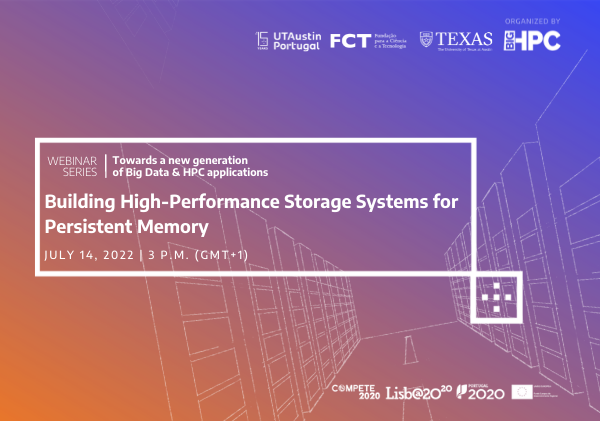After the success of the first webinar series, the UT Austin Portugal Program and the BigHPC consortium are back with a second round of webinars, running every two months from March 2022 to March 2023, called Towards a new generation of Big Data & HPC applications. This time around, experts from academia and industry will meet to look through some of the most relevant scientific and technological advancements made in response to the challenges we have dissected before.
Click HERE for full details on this 2nd edition!
Webinar 3: Building High-Performance Storage Systems for Persistent Memory

- Date: July 14, 2022 | 3.00 p.m. (GMT+1)
- Speakers: Rohan Kadekodi, PhD Student, Department of Computer Science, The University of Texas at Austin
- Moderator: Tânia Esteves, PhD Student, HASLab, INESC TEC & University of Minho
Persistent Memory (PM) refers to storage class memory that offers non-volatility, low latency and high bandwidth. A number of application can benefit from PM due to its unique characteristics. Legacy applications that are built for HDDs and SSDs use POSIX system-calls to access data on PM. Newer applications designed specifically to be used on PM access data by memory mapping files and performing loads/stores from user-space to PM-resident addresses.
First, we present SplitFS, a file system for PM aimed at accelerating POSIX system-call applications. SplitFS presents a novel split of responsibilities between a user-space library file system and an existing kernel PM file system. The user-space library file system handles data operations by intercepting POSIX calls, memory-mapping the underlying files, and serving the reads and writes using processor loads and stores. Metadata operations are handled by the kernel PM file system (ext4 DAX). In this way, SplitFS reduces software overhead significantly compared to the state-of-the-art POSIX file system atop PM.
Next, we introduce WineFS, a novel hugepage-aware PM file system that is aimed at accelerating memory-mapped applications. WineFS uses an alignment-aware allocation policy that allocated huge page-aligned extents for the memory-mapped files, while using up fragmented unaligned holes for the small files. WineFS uses a suitable on-PM layout and per-CPU journaling to ensure high scalability while avoiding free-space fragmentation and preserving huge pages (and thus, high performance) with age.
About the speaker:
 Rohan Kadekodi is a PhD student working with Prof. Vijay Chidambaram. He works on building systems software for Persistent Memory. In particular, he has built file systems for persistent memory that are aimed at accelerating legacy applications as well as newer applications that are developed for persistent memory.
Rohan Kadekodi is a PhD student working with Prof. Vijay Chidambaram. He works on building systems software for Persistent Memory. In particular, he has built file systems for persistent memory that are aimed at accelerating legacy applications as well as newer applications that are developed for persistent memory.
About the moderator:

Tânia Esteves is a 4th PhD student in the Doctoral Program of Informatics at the University of Minho, in Portugal. She obtained her Master’s degree in Informatics Engineering in 2018, with her Master’s thesis focusing on configurable and secure storage systems. She is currently a research assistant at HASLab, a laboratory of INESC TEC, and her research focuses on the monitoring of distributed systems, with emphasis on the analysis of the data flow.
Important information about our training activities:
– Participation is free of charge. Kindly note, however, that to put on a course, we mobilize several people and incur expenses. Therefore, if you register for an event of ours, we expect you to attend it, for every time we assign a seat to someone we are preventing someone else from participating.
– Participants will be sent a link to the session 2 hours before the start time. If you do not receive it, please contact us at events@utaustinportugal.org
– Since our online courses are available globally, use a time zone converter to know what time the session is starting in your location.
The BigHPC Project is co-financed by the European Regional Development Fund through the Operational Program for Competitiveness and Internationalisation – COMPETE 2020, the Lisbon Portugal Regional Operational Program – Lisboa 2020 and the Portuguese Foundation for Science and Technology – FCT under UT Austin Portugal.
